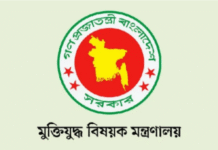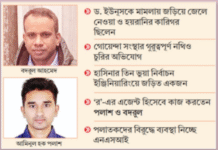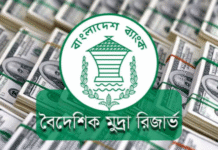
Though she could not pay homage to the language heroes at the very first hour as she was reportedly barred from coming out of her residence in due time, BNP Chairperson Khaleda Zia finally placed wreaths at the Central Shaheed Minar around at about 1.03 am on Friday.
Khaleda, also the former Prime Minister, along with her party’s senior leaders placed the floral wreaths at the altar of the Central Shaheed Minar paying homage to the martyrs of the 1952 historic Language Movement.
She stood for a few moments in solemn silence as a mark of respect to the memory of the language heroes.
“The BNP chief was ready to set out for the Shaheed Minar around 11:45 pm. But she could not go to the Shaheed Minar in due time due to police barricade,” her media wing member Sayrul Kabir Khan told UNB.
Sayrul alleged that additional police forces were deployed around Khaleda’s residence and political office to resist her from going to the Shaheed Minar.
Later, Khaleda went to her Gulshan office from her residence around 12:10am.
The BNP chief later set out for the Shaheed Minar from her office around 12:32am.
BNP senior leaders accompanied Khaleda.
Earlier, President Md Abdul Hamid paid tributes to the language martyrs by placing wreaths at the altar of the Central Shaheed Minar at 00:01am, followed by Prime Minister Sheikh Hasina.
Speaker Dr Shirin Sharmin Chaudhury, senior leaders of 14-party, led by AL Presidium member Mohammad Nasim, and foreign envoys also placed wreaths at the Shaheed Minar.
Besides, different political parties and their front organisations and various socio-cultural organizations also placing wreaths at the Shaheed Minar paying their homage to the martyrs of the Language Movement.
On this day in 1952, Salam, Barkat, Rafique, Jabbar and some other brave sons of the soil laid down their lives for recognition of Bangla as an official language.
The Pakistan government was ultimately compelled to incorporate an article in the constitution on February 29 in 1956 that declared ‘the state language of Pakistan shall be Urdu and Bengali’.
The protest sparked on February 21 in 1952 progressed into the long-drawn struggle that eventually led to the birth of independent Bangladesh in 1971.
Earlier in a message, Khaleda recalled with deep respect all the martyrs of the 1952 Language Movement and wished the success of the all programmes taken by different socio-cultural and political organisations to mark the day.
She also prayed for salvation of the departed souls of the martyrs of the Language Movement and conveyed her sympathy to the bereaved family members.
Source: UNB Connect









